Are You Sleeping in the Dog's Bed?
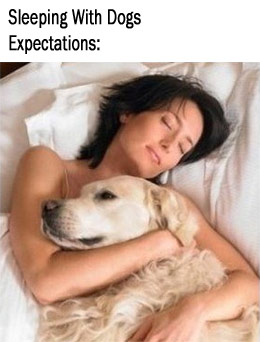 How many of us allow our dogs to sleep in our bed with us? Is sleeping with our dogs bad for our health? Could it even be bad for our dogs?
How many of us allow our dogs to sleep in our bed with us? Is sleeping with our dogs bad for our health? Could it even be bad for our dogs?
With the latest batch of 'sleeping with pets is bad for your health' headlines I wondered what the risks really are. Could there be any truth behind these claims, despite all the dog owners who allow their pets to sleep in their beds and remain in rude health?
On the other side of the coin - could sleeping in our bed be bad for our dogs? Does sharing our bed have any behavioural implications for our dogs, especially if, rather than your dog sleeping in your bed they think you are sleeping in their bed?
But before we tackle the possible issues, let's find out...
How many of us allow our dogs to sleep in our beds?
One media headline claims 'Nearly 60 per cent of dog owners pair up with their pooch in bed.'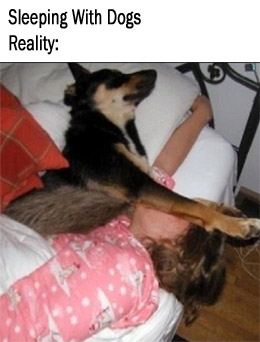 On the D for Dog forum I asked dog lovers what their views were with regards dogs on (or in) their beds. Our stats came out slightly less in favour of dogs in human beds. Just under half said they allowed their dogs on or in their beds.
On the D for Dog forum I asked dog lovers what their views were with regards dogs on (or in) their beds. Our stats came out slightly less in favour of dogs in human beds. Just under half said they allowed their dogs on or in their beds.
Many who did sleep with their dogs mentioned that even though it disturbed their sleep they still shared their bed with their pets. A couple of forum members said they found it reassuring to have their dogs with them at night.
Generally the only caveat was getting up time. As long as the dog realises that getting up time is when the human wakes up, not when they wake up, all seems to be well.
What about the health implications?
The media seems to take delight in warning us of the negative health implications of sharing our beds with pets.
When asked on our forum if anyone was worried about the possible health risks of sleeping with dogs (and cats) FJM answered "No - much safer than sleeping with another human".
In fact hardly anyone who posted mentioned that they were at all worried about the possible health risks. So despite the media continually trying to tell us that it is unhealthy, we don’t believe it and/or simply don't care. Or maybe we feel that the benefits outweigh the 'risks'.
So what are the health risks?
TV house cleaning guru Aggie MacKenzie thinks that sharing a bedroom with your pet is unhealthy.
"We know that cats and dogs wander outside and there are a lot of strains of bacteria in the soil that they can bring in. Also asthma is hugely on the rise and the dander (material shed from the bodies of animals) and so on from pets is a huge contributor to the trigger of asthma attacks" she says.
Didn't Aggie ever hear the old saying "you have to eat a pound of dirt before you die"? Exposure to germs helps strengthen the immune system. Living in modern sterile environments is far more of a health risk.
I am no doctor so, if you or your child suffers with asthma, please do research that issue because asthma is not to be taken lightly but here is something else rather interesting:
"Studies have shown that kids who grow up on farms and around livestock are less likely to develop asthma and allergies than those who live in more sterile urban environments."
The other health concerns touted by the media seem to be mostly of a parasitic nature e.g. worms, fleas etc... So make sure you treat and prevent these nasties, which is something you should be doing anyway. Problem solved.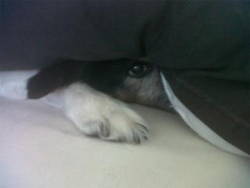 Many of the supposed health risks from licks, kisses, scratches etc... strike me as risks of simply living with a pet, whether you share a bed with them or not. All that's required is a little bit of common sense. Keep your pets clean and parasite free, treat any scratches you may get from your pet and be sensible.
Many of the supposed health risks from licks, kisses, scratches etc... strike me as risks of simply living with a pet, whether you share a bed with them or not. All that's required is a little bit of common sense. Keep your pets clean and parasite free, treat any scratches you may get from your pet and be sensible.
What about the Bubonic plague headline above? Pretty scary, huh. Well this seems to have come from one reported case of a 9 year old boy in Arizona who slept with his flea-ridden cat and contracted the plague. Did you know that rats do not directly spread the plague? It is actually the fleas on the rats that are the carriers of the disease. So, as already discussed, make sure your pets don’t have worms, fleas or other parasites and you can sleep safe in your bed at night - with your pets.
One of the newspaper articles also mentioned salmonella as a potential risk. I was curious - how could that be? It seems that particular headline came from an instance of contaminated dry pet food, so I am not sure why it was mentioned in a ‘pet bed sharing’ horror story. OK, maybe if your pet has rolled in their own faeces that happen to be contaminated with salmonella due to a rogue bag of contaminated kibble... in that case please do be sure to wash the faeces off your pet before you all settle down for the night. Simples!
Use common sense
Larry Kornegay, president of the American Veterinary Association, stressed that pet owners should use common sense to reduce risks (washing hands, regular vet visits) and added: "The benefits of having a pet, whether or not you sleep with it, far outweigh the negatives, which are quite uncommon."
Pets:
- lower our blood pressure
- reduce our cholesterol levels
- provide us with psychological comfort
- get us out and about, socialising and exercising
Learning independence
Forum member Lisa's dogs sleep downstairs. Lisa explained "I believe it helps dogs to learn to cope by themselves without us. We work and therefore, it is important the gang learn that being by themselves is a good thing, nothing will happen to them, it's nice, it's safe and it is perfectly normal."
It is an excellent point. A bit of happy and structured alone time never did anyone any harm.
Another forum member, Kathy, said a similar thing: "I don't like [my dog] to get too dependent on being with us at night in case we have to leave her (which we have on the rare occasions when she has gone to kennels)."
Teaching a dog to sleep in their own bed
"Teach them their bed is ONLY a place of comfort and safety. Never send them to bed negatively. They are never put to bed for doing an unwanted behaviour. Never let children touch them when they are in bed. Gentle introductions to a new bed/sleeping area/house/home... do everything steadily and put in a reward system. When they go to their bed, always praise them so they know it's a desired behaviour. No scolding for leaving the bed area. Reinforce with positiveness. Move the bed next to you if your dog is struggling, that way you are close. You can then gradually inch it away. First start off next to your bed, move slightly further away, move to the landing and so on. No need to punish the dog, they will gradually adjust but be reasonable, if it works with them on the landing, leave it. You could undo lots of work you have already put in and damage the dog’s confidence." says forum member Lisa.
Another forum member advised putting a t-shirt or jumper with your smell on it in with them, or lying on a new bed for a few minutes to transfer your smell on to it. It makes the bed smell of you, which is comforting to your pup or dog.
Whatever you do or try, there is one thing to make absolutely sure of - going to their bed must always be a happy and rewarding experience for your dog and never part of any punishment or confinement.
My dog prefers my bed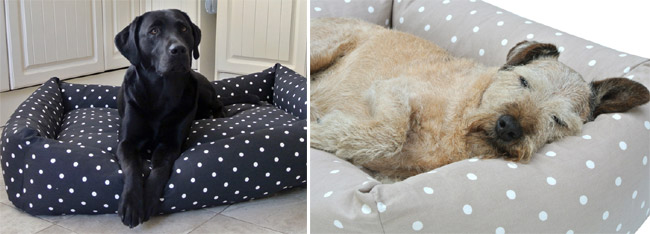
If you prefer a 'no dog' bed but are struggling to keep the dog out, consider that maybe your dog just really likes your bed. They might think the comfort provided by your bed is the best thing since sliced sausages.
Why might your dog prefer your bed? Their own dog bed may be uncomfortable compared to your lovely high, well sprung mattress with cosy, soft bedding. Many dog beds are woefully inadequate. Thin bottoms are the worst culprit. Get your dog a comfortable, quality dog bed and blanket. Place it in an area where there are no temperature extremes or draughts. Most dogs prefer cool to hot (they are wearing fur coats after all) but draughts are a no-no.
Can you let your dog choose?
Sam Tatters of Pawsitively Training says:
"As a dog owner and a trainer in training, my view is that as long as you can ask your dog to vacate your bed (or sofa, or anywhere else they choose to perch) AND that he or she won't chew/destroy it through the night there's no problem in bed-sharing if that's what your dog wants.
I'm happiest when my dogs are happy, and as I said above, unless there's some form of resource guarding issue, I'm happy to let my dogs choose where to sleep."
This is all leading to what may actually be the most important aspect of this whole debate. No, not potential health risks but simply this…
Does the dog know it is your bed?
One of my favourite dog related podcasts, DogCast Radio, had an episode where host Julie Hill had a discussion with behaviourist Debbie Connolly and trainer Nick Jones about whether dogs should be allowed to sleep on our beds.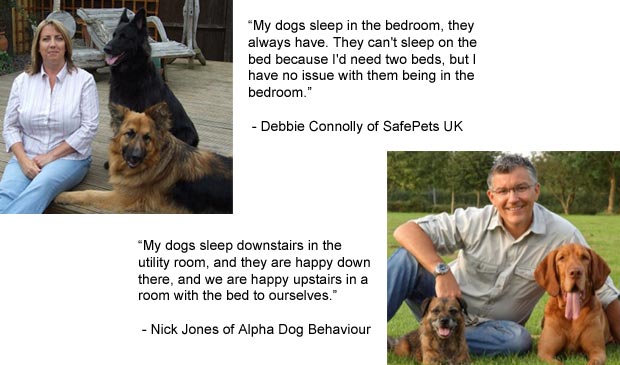
Debbie feels personal preference is the key but she does say that allowing her dogs on her bed and spending time with them is part of the deal and she likes the intimacy, the attention and the affection. It is a time she enjoys.
Nick says his decision is largely historical and based on personal preference. He says he doesn’t find the idea of dogs on beds abhorrent and mentions that a Sunday morning cuddle on the bed with his dog is great but at night time the dogs sleep downstairs.
When Julie asks Nick if there is ever an advantage to allowing a dog on the bed, Nick says he thinks it could increase bonding but also points out that ironically sometimes that bonding can go too far and the dog may be unable to cope when left alone and you may see issues such as separation anxiety. Nick also points out that if you do allow dogs on your bed it is prudent to have some rules. "Ultimately it's my bed. It's not their bed" agrees Debbie.
"Ultimately it's my bed. It's not their bed" agrees Debbie.
Here is the full DogCast Radio episode Sadie and the rattlesnake and dogs on beds.
This is a very important part of the 'sharing your bed with your dog' issue. It needs to be crystal clear to your dog that they are being allowed to share YOUR bed, not the other way round. The last thing you want is for your dog to think it is their bed and you are in it with them.
Are you sleeping in the dog's bed?
How do you know if the line has been blurred and your dog thinks you are sharing their bed?
Nick points out that when sharing your bed you need to make sure your dog understands it is your bed and sharing it is a privilege and not a right.
"When the dog feels it's a right we may see dominant behaviour (growling when the owner moves, or the dog may resist being removed from the bed) creep in and if we sleep with a dog from day one of puppy ownership say, the owner is very likely to create a bond that is so close that they then may have difficulty in leaving the dog alone in the day" says Nick.
Be consistent
Julie also spoke to us on D for Dog about the issue of dogs on beds and said whatever you choose, be consistent.
"To me the key is that you make a decision that works for you and your dog, and then stick to it."
Julie also points out that as long as everyone is healthy and happy and you have found what works for you and your dogs then that is all that matters - "there is no wrong and right."
As long as everyone is happy with the sleeping arrangements and no one is losing sleep, resource guarding or getting too clingy, go with whatever suits you all. As for the supposed health risks, I am not falling for those sensationalised ‘news’ headlines. In fact many studies have shown that pet owners have stronger immune systems, thanks to our furry friends.
By Jenny Prevel
© D for Dog www.dfordog.co.uk
This article belongs strictly to D for Dog and we do not authorise the copying of all or any part of it.


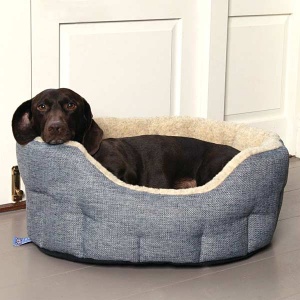
What an interesting article. I like the way it is unbiased, looking at the subject from various points of view. I totally agree that dog owners are generally healthier and they often have better immune systems than non dog owners. Loved the comment about eating a pound of dirt hahahah, very true! Well done D for Dog on an excellent, well researched article.
Janine
we sleep with our dogs. as long as we are alphas, who cares. so far I have not gotten any fleas. we keep them utd on all meds. our new male deaf puppy, now that's a diff. ques. I wish there was a dog chat here. arf arf
Do you mean a forum for chatting about dogs, Mae? If so, visit http://forum.dfordog.co.uk/
I think aggi mackenzie want.s to crawl back back in her box , what a load of junk i am 57 years old and grew up with dogs in my bed (or trying to kick me out ) and i have no probs with illness every one at work has colds and flue not me as to asthma on the rise the main cause is the diesel car and the junk that is thrown out the exhaust every time it starts , anyway dogs are a dam good hot water bottle never get cold .. Take care all Jezz........
I have no problems with a dog sleeping on beds. Mine usually sleeps in his own bed and has done so from a pup. However I do 'forget' to put him to bed when my husband works away!
Our dog sleeps with us, as did our previous dog and we've never caught anything. In fact I suffer with chronic depression and having my dog with me at night, as in the day is more beneficial to me that not having him with me. My husbands job as a carer for brain injury clients means he has to sleep over occasionally and having my dog with me makes me feel more secure